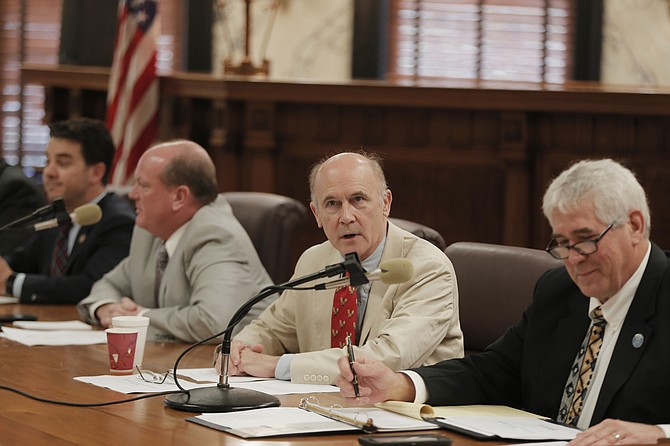Sen. Hob Bryant, D-Amory, told the Senate Finance Committee that Senate Bill 2455 would send a slightly larger share of state sales tax revenue to cities and counties to help pay for infrastructure projects such as roads, bridges and water and sewer system improvements. Photo by Imani Khayyam.
JACKSON, Miss. (AP) — Democratic Sen. Hob Bryan of Amory is generally regarded as one of the smartest people in the Mississippi Capitol, even by those who oppose him ideologically and those who roll their eyes at his occasional finger-pointing, vein-popping rants about public policy.
The 65-year-old attorney earned his law degree at the University of Virginia. He has served in the state Senate since January 1984 and was a primary author of the current school funding formula that was put into law in 1997. He has a deep understanding of the complexity of the state tax structure and other issues.
Bryan has an impressive vocabulary and casually incorporates foreign words or phrases into conversations or debates — "de minimis," ''divertissement."
But he can also revert to a preschool level of word choice while holding forth against proposals that he considers bad ideas.
"The amount of pee pee and poo poo varies directly with number of people ... and it does not vary based on your sales tax collection," Bryan said last week.
His made the remark during a Senate Finance Committee meeting as part of a lengthy argument against Senate Bill 2455 . The bill would send a slightly larger share of state sales tax revenue to cities and counties to help pay for infrastructure projects such as roads, bridges and water and sewer system improvements.
Republican Sen. David Parker of Olive Branch is the chief sponsor of 2455 and is, himself, no academic slouch — he's an optometrist. Parker said diverting more money from the state budget into city budgets would help the cities solve the vexing problems of potholes, weak bridges and broken water lines.
"I do see this as something that puts people to work," Parker said, citing construction jobs that would come with infrastructure projects.
Bryan, who once chaired the Finance Committee when Democrats controlled the Senate, said fixing roads, bridges and water systems is important, but: "The only way you're going to have an impact on infrastructure, which we desperately need to do, is to have a big pile of money, have that big pile of money used for infrastructure and have that money dealt with separately, apart from everything else."
He also argued, as he has before and will again, that cities that are trade centers receive disproportionally large benefits from sales taxes. Bryan said, for example, that the Jackson suburb of Flowood has stretched its city limits along Mississippi Highway 25 and has become a retail hub that draws shoppers from the metro area and beyond.
"By far, by far, by far, by far, you're going to send more money per capita to Flowood than anywhere else," Bryan said. "Look at the so-called infrastructure problems in the Jackson metropolitan area and tell me Flowood is the poster child for who we need to go do something: 'We need to go help Flowood with their infrastructure.'"
The city of Jackson has a larger population and older infrastructure than Flowood and other suburbs. Amid cold snaps in January, Jackson reported having 301 broken water lines, which caused widespread boil-water notices and forced schools to remain closed for several days.
Bryan said officials and merchants in Flowood "haven't done anything wrong."
"But if we were seriously trying to do something to help municipalities," he said, "we would not be sending money back to the point of collection."
Senate Bill 2455 awaits consideration of the full Senate. In early January, the House passed House Bill 354 , which would send more state money to cities and counties for repair and maintenance of local roads. It will be sent to a Senate committee.
Copyright Associated Press. All rights reserved. This material may not be published, broadcast, rewritten, or redistributed.
More like this story
- Plan Would Send More Tax Money to Cities for Roads, Water
- Mississippi House Rolls Out New Roads, Bridges Funding Plan
- McDaniel: Highway Bill ‘Unfair Tax Policy,’ Would Hurt Poor, Middle Class
- A Bi-Partisan Mutiny Over Roads and Bridges
- Mississippi Senate Passes Income Tax Cut Slashing $446 Million in Revenue



Comments
Use the comment form below to begin a discussion about this content.
comments powered by Disqus